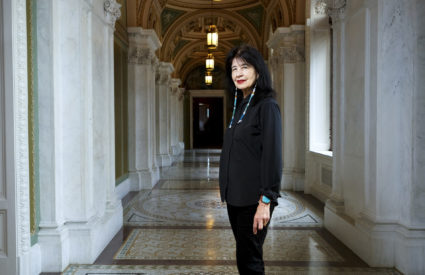
The song, released Wednesday, describes how “a city aflame fought fire and ice ’neath an occupier’s boots,” which Springsteen calls…

Joy Harjo, the first Native American poet to serve as U.S. poet laureate, has been reappointed to a rare third term by the Library of Congress.
Harjo, an enrolled member of the Muscogee Creek Nation, was initially appointed in 2019. At the start of her tenure, Harjo explained what that honor meant for Indigenous peoples in particular.
"Some of us are astronauts. Some of us are really good at fixing cars," she told the PBS NewsHour at the time. "But we're human beings. And some of us write poetry … it makes a doorway of hope."
Harjo is the second poet laureate to serve this many terms in a row since the current duties of the position were established 77 years ago. (Robert Pinsky was the first.)
Harjo's new term officially begins in September next year.
In a statement announcing the reappointment, Librarian of Congress Carla Hayden wrote that, amid the novel coronavirus pandemic, Harjo "has shown how poetry can help steady us and nurture us."
In October, Harjo said she was honored to serve during a crisis like the pandemic.
"We always go to poetry in times of transformation, you know — birth, death, marriage, falling in love, out of love," she told the NewsHour. "But here we are at a time of tremendous transformation — and where do we go? And here we are with poetry. And I get to help during this huge, transformative event that we're all part of."
U.S. Poet Laureate Joy Harjo reads her poem "Running," which appears in her latest poetry collection, "An American Sunrise." Video by PBS NewsHour
Harjo also completed her "Living Nations, Living Words" project, which formally launched today during Native American Heritage Month. The online map collects biographies and recordings from dozens of contemporary Native poets across the country. (You can explore the archive here.)
In an introduction to the project, Harjo explains that she wanted to map these poets and their work to "counter damaging false assumptions — that indigenous peoples of our country are often invisible or are not seen as human."
"You will not find us fairly represented, if at all, in the cultural storytelling of America, and nearly nonexistent in the American book of poetry," she added.
The digital archive, which was developed with the Library of Congress' Geography and Map Division, allows visitors to hear from the writers themselves. Poets like Louise Erdrich, Natalie Diaz, Ray Young Bear, Craig Santos Perez, among others, read and discuss their poems, which center on the themes of place and displacement.
Heather Cahoon, a member of the Confederated Salish and Kootenai Tribes and poet located in Missoula, Montana, shared her poem, "Baby Out of Cut-Open Woman," as part of the collection. In a recording online, she explains how her poem reminds its audience that "tribal stories were not imported" or "not brought here from somewhere else."
"They were given to people right here and they are intertwined with and directly tied to this particular landscape," she said.
For the poem "Hell's Acre," Sy Hoahwah, who is Yapaituka Comanche and Southern Arapaho and resides in Comanche County, Oklahoma, explains that he was nodding to the experience of being in two places at the same time.
"I consider myself an Indigenous poet, but yet also a Southern poet. And also neither. I consider myself just a man," he added.
Harjo's digital map is an extension of her continued work to fill the gap where American literature either hasn't properly represented Native voices, or has only done so "in shards or little pieces here and there."
"The story of America begins with Native presence, thoughts and words," she said in a statement announcing her third term. "Poetry is made of word threads that weave and connect us."
READ MORE: Joy Harjo on how a new Native poetry anthology fills a gap in American literature
Sustain our coverage of culture, arts and literature.